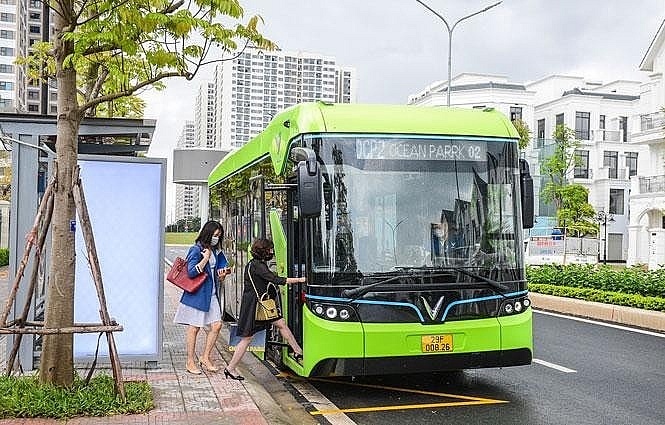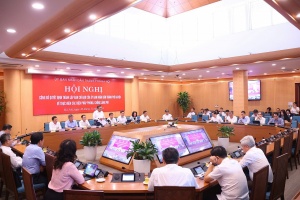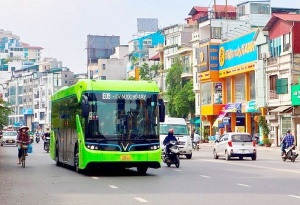Hanoi needs public-private partnership to green bus fleet
In late November, Hanoi People's Committee approved the "Project to Develop Public Transport System By Bus Using Electricity and Green Energy in the City." The plan outlines a roadmap to achieve 100 per cent electric and green-energy buses in the city by 2035.
 |
| A Vinbus station located in Ocean Park |
Pham Dinh Tien, head of Planning and Operations at the Hanoi Public Transport Management and Operation Centre, highlighted the city’s early focus on transitioning to green energy for public transport.
“In 2017, seven bus routes were converted to compressed natural gas (CNG) fuel. By late 2021, Hanoi launched the country’s first three electric bus routes. Currently, the city operates 10 electric bus routes,” Tien said.
He also noted that in July 2022, the prime minister approved an action programme for green energy transition and carbon and methane emission reductions in the transport sector, which formed the basis for Hanoi to develop its green public transport plan.
Under this roadmap, Hanoi will operate 128 to 153 electric bus routes by 2035. Urban routes will exclusively use electric buses, while suburban routes will deploy green-energy buses like CNG or liquefied natural gas.
In the initial phase, the focus will be on integrating electric buses with urban railways. Authorities plan to establish service standards and provide tailored benchmarks to support enterprises in operating the green fleet efficiently.
The transition requires significant investment, with calculations showing a need for over $2 billion. Nearly $1.5 billion will come from the city budget, while more than $525 million will be covered by enterprises.
Nguyen Cong Nhat, CEO of Vinbus, the pioneering company in electric bus operations, emphasised the complexity of planning charging infrastructure.
“Unlike diesel buses, which only need refuelling, electric buses require precise calculations for charging schedules and capacity,” Nhat said. “Vinbus has already installed charging stations at two depots, Ocean Park in Long Bien district and Smart City in Nam Tu Liem district, to meet operational needs.”
According to Viet, Electric buses are charged during off-peak hours, from 9a.m. to 4p.m. leveraging surplus electricity and easing concerns over energy supply. This approach allows enterprises to adapt charging infrastructure to their specific needs.
Regarding interest rate support, the Hanoi Public Transport Management and Operation Centre acknowledged challenges in implementing Resolution No.07/2019/NQ-HDND, which offers 50 per cent interest subsidies for public transport development. Adjustments are underway to address these issues and refine the policy framework.
 | C.P. Vietnam promotes green lifestyle at 2024 Green Vietnam Festival On November 9-10, CP Vietnam held an exhibition booth at the Green Vietnam Festival, held at the Youth Cultural House in Ho Chi Minh City. |
 | Hanoi strengthens measures to prevent mismanagement and wastage of public assets On November 20, Hanoi People's Committee announced the establishment of a steering committee to implement measures preventing the misuse and waste of public assets, aiming to optimise the use of social resources and state budgets. |
 | Hanoi bus system to be fully green by 2035 Hanoi aims to use 50 per cent electric buses and 50 per cent renewable energy buses by 2035, with an estimated budget of approximately $1.9 million. |
What the stars mean:
★ Poor ★ ★ Promising ★★★ Good ★★★★ Very good ★★★★★ Exceptional
 Tag:
Tag:
Related Contents
Latest News
More News
- $100 million initiative launched to protect forests and boost rural incomes (January 30, 2026 | 15:18)
- Trung Nam-Sideros River consortium wins bid for LNG venture (January 30, 2026 | 11:16)
- Vietnam moves towards market-based fuel management with E10 rollout (January 30, 2026 | 11:10)
- Envision Energy, REE Group partner on 128MW wind projects (January 30, 2026 | 10:58)
- Vingroup consults on carbon credits for electric vehicle charging network (January 28, 2026 | 11:04)
- Bac Ai Pumped Storage Hydropower Plant to enter peak construction phase (January 27, 2026 | 08:00)
- ASEAN could scale up sustainable aviation fuel by 2050 (January 24, 2026 | 10:19)
- 64,000 hectares of sea allocated for offshore wind surveys (January 22, 2026 | 20:23)
- EVN secures financing for Quang Trach II LNG power plant (January 17, 2026 | 15:55)
- PC1 teams up with DENZAI on regional wind projects (January 16, 2026 | 21:18)





















 Mobile Version
Mobile Version